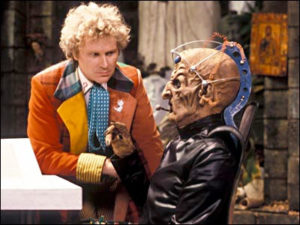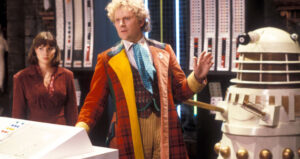On First View: Revelation of the Daleks
Guest contributor Antti Björklund continues the series offering a first time view on a Classic story.

- Catch up with the first article looking at “The Dalek Invasion of Earth”
- Catch up with the second article looking at “The Mind Robber”
- Catch up with the third article looking at “The Time Warrior”
- Catch up with the fourth article looking at “Genesis of the Daleks”
- Catch up with the fifth article looking at “The Caves of Androzani”
In Doctor Who Magazine’s The Mighty 200 poll in 2009, Revelation of the Daleks was voted as the 46th most liked story, one place higher than The Time Warrior and two places lower than The Dalek Invasion of Earth. In the 2014 poll it was voted 70th.
In case there are readers for whom this is the first article of this series they read, here is a reminder about what this series is about: in this series, I will try and evaluate exactly how good the episodes I have not seen before, or have seen only a couple of times, are from the viewpoint of someone watching the episodes for the first time. I will try and make note what are the episode’s strengths and weaknesses.
Revelation of the Daleks is the season finale of Season 22. After this story the show was put on an 18-month hiatus. The following season would be the swansong of Colin Baker as the Doctor, although this wasn’t known at the time.
The Characters
At the time of the broadcast of this story, Colin Baker had been appearing in the role of the Doctor for a little over a season, having made his first (albeit brief) appearance in the previous season’s penultimate story The Caves of Androzani; after which he appeared in that season’s final story.
Perpugilliam “Peri” Brown accompanies Baker’s Sixth Doctor. She is an American College student portrayed by Nicola Bryant, and was also a companion to the Fifth Doctor from Planet of Fire until the Doctor’s regeneration in The Caves of Androzani.
The Doctor
 The Doctor is a double-edged sword, so to speak. At times he can be quite strict or even mean, but at other times he can crack a joke. An example of the latter is in part one of the story, when the Doctor jokes to Peri that “America doesn’t have a monopoly on bad taste”, referring to the name of the place they are going to visit, Tranquil Repose.
The Doctor is a double-edged sword, so to speak. At times he can be quite strict or even mean, but at other times he can crack a joke. An example of the latter is in part one of the story, when the Doctor jokes to Peri that “America doesn’t have a monopoly on bad taste”, referring to the name of the place they are going to visit, Tranquil Repose.
Colin Baker’s Doctor isn’t, to me, as bad as his reputation among the fans seems to suggest. Sure, he brandishes a gun in Revelation of the Daleks’ final moments, but he is also kind and caring. The differences shown in the story of this incarnation’s differences from his previous incarnation may be down to his rather delirious regeneration.
The Companion
 Peri in Revelation of the Daleks is rather different from what she was in The Caves of Androzani. Whereas in the earlier story Peri was a screamer and a standard “damsel in distress” type, in Revelation of the Daleks she shows a whole different side to herself. Peri in this story is compassionate and kind, which is evident in the scenes where she clearly is worried about the Doctor and whether he survives. Her backstory of being an American student of botany is referenced a couple of times, but takes no major part in the story.
Peri in Revelation of the Daleks is rather different from what she was in The Caves of Androzani. Whereas in the earlier story Peri was a screamer and a standard “damsel in distress” type, in Revelation of the Daleks she shows a whole different side to herself. Peri in this story is compassionate and kind, which is evident in the scenes where she clearly is worried about the Doctor and whether he survives. Her backstory of being an American student of botany is referenced a couple of times, but takes no major part in the story.
The Monsters and Villains
 The villain of the story is Davros, creator of the Daleks, and the monsters of the story are therefore the Daleks.
The villain of the story is Davros, creator of the Daleks, and the monsters of the story are therefore the Daleks.
Based on part one alone, Davros doesn’t seem to be doing anything else other than plotting in the shadows and begging for more money to conduct his experiments. He seems to be a shadow of his Genesis self, which in part is attributable to him being only a head on a life-supporting machine. However, it is revealed that his experimentations are done to expand the Dalek power by creating Daleks out of other, non-Kaled, beings.
However, being Davros, this turns out to be a ruse in part two. In this part the full horrors of Davros’ experimentations come to light, as it is discovered that he has used the bodies of the people at Tranquil Repose to not only create new Daleks, but also to create a source of food that could be sold to provide funds for his experimentations. He also can be seen as having gained a sense of humor. This is especially clear in a scene where he is asked if people knew what they had been eating and he replies with a line along the lines of “of course not, that would cause what I believe to be known as… consumer resistance.”
The Daleks in this story seem, at least at first, to be only as servants to Davros. However, this too turns out to be a ruse as one faction turns against Davros and appear to start a Dalek Civil War.
The Overall Story
 Season 22 is, I’ve come to understand, not very liked among the fandom. But if you look at it from a non-linear, non-subjective point of view, it’s more like a big ball of moderny-woderny story-wory type of season. The stories are 45 minutes in length, as opposed to the standard 25 minutes of other seasons, the stories were two or three parts in length and the season was 13 episodes long. All of these aspects are familiar to viewers familiar with the post-2005 Doctor Who, which in my opinion makes this season easy to introduce to a first-time viewer.
Season 22 is, I’ve come to understand, not very liked among the fandom. But if you look at it from a non-linear, non-subjective point of view, it’s more like a big ball of moderny-woderny story-wory type of season. The stories are 45 minutes in length, as opposed to the standard 25 minutes of other seasons, the stories were two or three parts in length and the season was 13 episodes long. All of these aspects are familiar to viewers familiar with the post-2005 Doctor Who, which in my opinion makes this season easy to introduce to a first-time viewer.
Apart from the production similarities in the story, there are multiple other points in the story that also make this story easy to introduce to a first-time viewer. The first of these is the character of Mr. Jobel. He is played by Clive Swift, who to New Who viewers is more familiar as Mr. Copper the historian from Voyage of the Damned. The second is the fact that in this story Davros loses his other hand, and as can be seen in the Series four two-part finale, Davros has procured a metal artificial hand instead. Graeme Harper, who has also directed many post-2005 episodes of the show, directs the story. It features Trevor Cooper, who was announced a while back to be appearing in Mark Gatiss’ episode in Series 8.
As for the story itself, it is a slow starter. Practically all of the main action happens in part two. This, however, isn’t necessarily all that bad, as it does give some room for character moments, especially between Peri and the Doctor. However, if a slow starter isn’t your thing, this story might be a hard view for you.
There are some, shall we say, weird things in Revelation of the Daleks. The biggest one, for me, is the part of the DJ on Tranquil Repose. Although his role in the facility is somewhat explained in the story, the acting from the person cast in the role seemed rather weird to me. When he first appeared, my reaction was something along the lines of “what the…”
The scene at the end of part one, in which the Doctor contemplates his own death and arriving at a place at a point in time after his own demise, strongly resembles similar musings made by the Doctor in The Name of the Doctor.
The story has clearly taken some ideas from the works of Shakespeare, as is evident by the high amount of people dead at the end and also from some of the character names, such as Oberon and Orcini, although to be fair the first of these isn’t really a character but the name of a Order that is mentioned in the story.
All in all, Revelation of the Daleks has some sets that are quite close to the show’s post-2005 sets in quality. The acting, especially from the main two, is quite good – except for some minor bits in some scenes, when the acting seems more like over-acting. The story starts slowly, but reaches a satisfying conclusion. The monsters and villains may seem to be bland, but by the end of the story they have really delivered.
Next time: Battlefield








